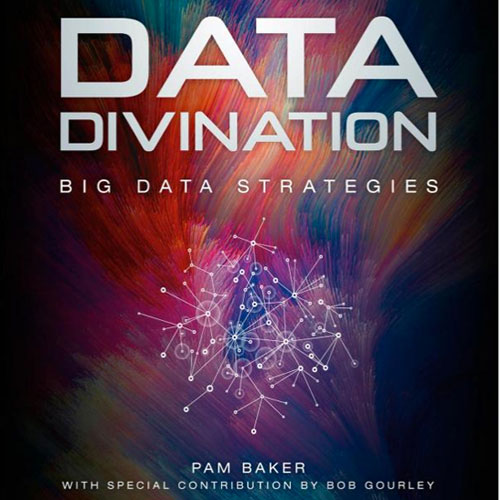![]()
Data Divination: Big Data StrategiesBy Pam Baker with special contribution by Bob Gourley Cengage LearningAugust 21, 2014, 432 pp.US$25.89 paperbackMost of today’s books about Big Data delve into highly technical tools, cloud technology, and high-level computer-assisted math calculations and algorithms. For most people in the business world, this is far from motivating readers to appreciate just what Big Data does and how to let it get you there. However, that’s not so with Data Divination: Big Data Strategies by Pam Baker.
Baker succeeds where other Big Data authors fail. She has a keen understanding of analytics and how that applies to Big Data. Baker takes that insight and masterfully details the strategies that business leaders need for Big Data to make sense to their specific operations.
Why is this an essential skill for business? Big Data is transforming what businesses must know in order to keep up with their competition. Big Data is not some server-residing algorithm that is the sole domain of the IT manager.
Rather, Big Data drives a flood of information accelerated by Internet growth and mobile communications expansion. Business leaders who can not harness the power behind that flood will float to the edges of the turbulent waters.
Data Divination: Big Data Strategies focuses on how to harness both the structured and the unstructured nature of Big Data. Baker tells readers what they need to know and how to execute a plan using what they learn from their data.
The U.S. Chamber of Commerce Foundation included Data Divination: Big Data Strategies in a recommended reading list targeting those interested in topics related to data-driven innovation.
Paging Through Content
Data Divination makes its strategic case in 21 chapters. The first five set out to answer the questions critical thinking requires. Baker focuses on three: what, how and why.
These are simple words that shape critical questions. The answers bring readers a long way toward learning how they can tame Big Data in their own business settings.
For instance, Baker asks what is Big Data, really? She shows how to formulate a winning Big Data strategy. She tells how to ask the right questions of Big Data. Then she explains how to pick the right data sources. Finally, she explains why the answer to your Big Data question resembles a Rubik’s Cube.
Technology Primer
The first five chapters clearly lay out the role that Big Data is playing in driving business intelligence. The content superbly presents the essentials and leaves room for applying the insights.
The middle four chapters keep the brain engaged through topics that provide even deeper insights. Always, the focus is on not just understanding Big Data — but learning how to use it.
For example, chapter six addresses the role of real-time analytics in developing your strategy. Chapter seven discusses the proposition and monetization value of Big Data. Chapter eight presents the factors bringing the rise of the collaborative economy and ways to profit from it.
Chapter nine is a study in its own right that could stand alone as required reading for everyone involved in data gathering. “The Privacy Conundrum” drives home very effectively the disparity of privacy and security.
The Venn diagram of privacy vs. security on page 164 is very compelling — and chilling.
Picking on Industries
The journey to understanding how to strategize about Big Data becomes very industry-specific in the rest of Baker’s book. She devotes a detailed chapter each to scoping out specific tactics of 10 industries: government; the Department of Defense and Intelligence community; security; healthcare; small businesses and farms; energy; transportation; retail; banking, insurance and finance; and manufacturing.
Baker and Bob Gourley present real case studies that do more than lay out a single narrative of each real-life scenario. They pick the situations apart and discuss them from several angles. This is an area that really pays off for the reader.
Gourley, the editor-in-chief of CTOvision.com and founder and chief technology officer of Crucial Point, brings a fresh authoritative view to this discussion in the few key chapters he contributes. He was the first Director of Intelligence at the Department of Defense’s Cyber Defense Organization JTF-CND (Joint Task Force-Global Network Operations). He also served as the chief technology officer of the Defense Intelligence Agency.
Powerful Duo
I am by no means anything close to a Big Data expert, but I know great technology discussion when I read it — and that was the hook that kept me focused on what Baker and Gourley had to say.
Experts in their fields can not always bring the importance and the immediacy of their passion to life. Neither of these authors suffers from that inability. The content of Data Divination: Big Data Strategies gives business pros and technology experts a hip pocket learning tool.
This book is loaded with information on how to choose and use data sources that get the results needed to empower a workforce.
About the Author
Business analyst Pam Baker is a freelance technology journalist who has been a member of ECT News Network’s team since 2007. Her work appears in Institutional Investor and CIO, among other publications. She is also the editor of the online publication and e-newsletter at FierceBigData. Baker conducted and authored several market studies on technology as an analyst for VisionGain Research and served as a researcher, writer and managing editor for ABI Research.





















































